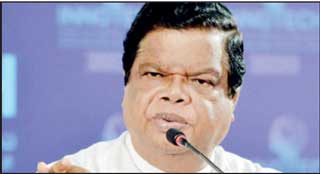Saturday Feb 14, 2026
Saturday Feb 14, 2026
Wednesday, 27 July 2022 00:22 - - {{hitsCtrl.values.hits}}
 |
| Cabinet Spokesman Bandula Gunawardena
|
Cabinet Spokesman Bandula Gunawardena yesterday insisted that the new QR code system was the only way to stop the irregularities in fuel dispensing and to address the shortage amidst the ongoing economic crisis.
“Whether we like it or not, only a technology system can put an end to all the irregularities in fuel distribution. No one can rule out that there will be zero technical glitches, but it is said to be the best methodology. We must give it a go,” he told journalists at the post-Cabinet meeting media briefing yesterday.
He said all Ministers had been directed to submit a report on an estimated amount of fuel required for all the agencies under their purview.
“We hope this methodology will also help to utilise the fuel most effectively by cutting costs on unnecessary travelling in the ministries as well as all institutions coming under their purview. The Ministry Secretaries have already begun on the calculation and the final requirement will be submitted to the Power and Energy Ministry by the end of this week,” he added.
The Cabinet Spokesman also pointed out that this methodology also implied to Sri Lanka Police and Tri-Forces, thus the irregularities linked to fuel dispensing would be resolved.
Many claim that the Police and military personnel misuse their rankings and uniform to get fuel quantities beyond the stipulated quota, whilst creating unrest among law-abiding motorists who are patiently and desperately waiting for it for days, weeks, and months.
Gunawardena said as a 100% fuel importing country, Sri Lanka is no longer in a position to bear the nearly $ 7 billion bill with just $ 12 billion export income per annum, whilst earnestly calling on the public to be patient and support the Government’s initiative to rollout the National Fuel Pass from 1 August.
“The fuel bill for 2022 is estimated at $ 6.7 billion – the highest in Sri Lanka’s history. This is an increase of $ 4 billion compared to 2015, which was at $ 2.7 billion. The price increase of fuel was mainly due to supply chain constraints and political uncertainties as many countries are today grappling with multiple issues in social, political and social sectors,” he explained.
He also revealed that over four million motorists have registered for the National Fuel Pass, adding that 245 filling stations countrywide yesterday tested the new system, whilst 70,123 vehicles were given petrol and diesel on Monday.
To further ease the fuel queue congestion, Gunawardena said 107 State-run depots would provide fuel to CTB and private buses, school buses, and private school vans, to ensure public transportation.
However, when asked if the three-wheelers were being regulated, the Minister chose not to answer.
Commuters claim that three-wheel drivers are acting as opportunists to earn extra money from the crisis, by charging Rs. 500 to Rs. 1,000 for a one or two kilometre hire at present.